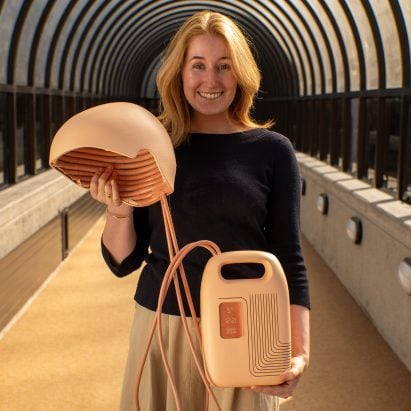A scalp-cooling wearable for cancer patients and an “autorotating” weather sensor shaped like a maple seed have been announced as the international winners of the 2024 James Dyson Award.
The Athena helmet was named this year’s global Medical winner while the AirXeed Radiosonde was crowned Sustainability winner, with both projects receiving £30,000 in funding for further research and development.
Athena was named Medical winner for this year’s James Dyson Award
The Athena wearable uses scalp cooling to reduce hair loss in chemotherapy patients and was developed by University of Limerick graduate Olivia Humphreys after witnessing her mother’s painful battle with cancer.
Featuring a battery-powered design, the device uses a thermal control module to cool a reservoir of water stored in a small portable tank, which is circulated around the scalp through soft tubing fixed to the inside of a headpiece.
The scalp-cooling device features a portable battery-powered design
Athena provides a “patient-controlled” solution through its portable design that enables its use outside of hospitals and, according to Humphreys, reduces the time patients have to spend on wards.
The device is offered at a twentieth of the price compared to existing technology, making it an affordable alternative to current scalp-cooling therapies.
“Athena’s goal is to make scalp-cooling therapy – currently a limited and costly treatment – more accessible for cancer patients undergoing chemotherapy to help minimise hair loss,” Humphreys told Dezeen.
“Battery-powered and compact, the device gives patients the flexibility to use it at home or during commutes, adding convenience and autonomy.”
AirXeed Radiosonde was named the Sustainability winner
The AirXeed Radiosonde was designed by engineers Shane Kyi Hla Win and Danial Sufiyan Bin Shaiful from the Singapore University of Technology and Design to offer a more sustainable alternative to the single-use sensors attached to weather balloons.
Modelled on the “autorotation of maple seeds”, the radiosonde features an asymmetrical shape that makes it spin as it falls. This allows the weather instrument to collect and transmit more atmospheric data to weather stations compared to traditional radiosondes.
Additionally, the device’s controlled descent prevents damage as it lands and increases its likelihood of landing in an accessible location, encouraging its reuse.
The device features an asymmetrical shape resembling a maple seed
“Our autorotating glider features a unique single-wing design with a large, controllable flap that enables directional control similar to a helicopter rotor,” the duo told Dezeen.
“The flap can alternate between gliding and a fast, direct descent mode, allowing the device to reach collection zones with precision.”
The duo intend to test the device in “real-world trials” to refine the product and envision AirXeed Radiosonde to become a new standard for the weather industry.
Previous winners of the James Dyson Award, recognising the best inventions by student and graduate designers, include a hands-free IV device for disaster zones and an infection-sensing wound dressing.
The photography is courtesy of the James Dyson Foundation.
The post Anti-hair loss helmet for chemo patients wins 2024 James Dyson Award appeared first on Dezeen.

